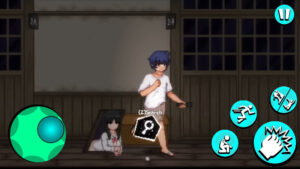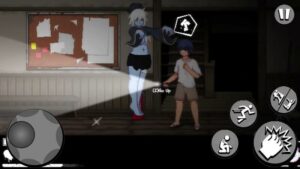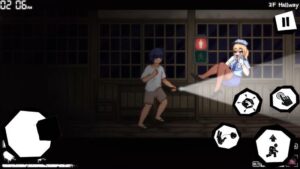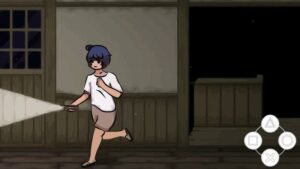Tag After School
Description
Tag After School APK: An Immersive Horror Simulation Adventure for Android
Tag After School APK is an Android horror simulation and adventure game set in a spooky school environment where players control a student who faces dares, mysteries, and chilling challenges after class hours. For anyone ever stuck at school after the bell, wondering what happens when the lights go out, this game serves up a healthy slice of suspense with a dash of nostalgia and humor. You guide the shy protagonist, Shota-Kun, through an abandoned building, encountering odd events, making critical choices, and solving puzzles that evoke both a classic mystery game and a choose-your-own-adventure style narrative experience. This unique mobile game blends elements of a visual novel and a role-playing game, offering a taste of Japanese horror with every twist. Whether you’re curious about horror simulation on mobile devices or exploring via PC emulator, the title will catch your attention right away. Let’s dive deeper into what makes this adventure game distinct in the English language market.
Journey Through the School Environment in This Android Mystery Game
Narrative Concept and Setting
Tag After School invites players to experience a horror simulation adventure laced with elements of mystery and decision-making. The game unfolds within a classic Japanese school environment, transformed by darkness into an eerie maze of secrets and supernatural surprises. Solo play is at the heart of the experience; every corridor holds new choices and every classroom hides forgotten stories. Player decisions face a challenge, open a suspicious door, pick up a cryptic note each can change the story’s direction, with a strong focus on choose-your-own-adventure mechanics. This approach keeps the narrative experience fresh and personal, making each playthrough unique.
The game’s design draws from classic Japanese visual novels and pixel art, blending them with a modern sense of tension and unpredictability commonly found in Japanese horror titles. As you guide Shota-Kun through the deserted halls, you encounter hints of teamwork, clues for puzzle-solving, and situations that demand quick thinking. There’s a nod to ‘90s role-playing games, mixing nostalgia with a modern twist creating a mystery game that balances familiar school settings and supernatural unease.
Target Audience and Accessibility
- Anyone who enjoys adventure games with a horror edge will feel right at home.
- Players who love narrative-driven experiences, such as visual novels, will appreciate the branching storylines and character development.
- Young gamers and children who crave a good mystery without extreme violence or intensity can also enjoy the title, since the scares come more from suspense than from gore or shock.
- Android users seeking a mobile game that is simple to pick up yet engaging for longer sessions will find it fits their needs and for those playing in English, accessibility is prioritized.
Unlike many complex horror games, Tag After School is approachable for both newcomers and seasoned mystery fans. The user interface is intuitive, ensuring players can focus on the narrative experience and decision-making without getting lost in excessive controls, whether on mobile or through a PC emulator.
Narrative Experience and Decision-Making in Tag After School’s Adventure Game
Main Character and Plot Structure
The story centers on Shota-Kun, a reserved student whose friends challenge him to explore a school rumored to be haunted. The premise may recall goosebump-inducing sleepovers or late-night dares, but here, choices matter and the branching narrative is central. Shota-Kun’s journey, wrapped in classic Japanese horror themes, involves traversing shadowy corridors and facing pivotal decisions that shape the overall storyline.
The structure of the game follows a series of key choices:
- First, Shota-Kun must gather courage to enter the building, setting the emotional tone.
- Next, he explores different environments within the school, each encounter influenced by decision-making.
- Key events unlock based on which clues you find and actions you take, emphasizing puzzle-solving.
- The story leads to several possible endings, encouraging replay to discover alternate outcomes and making this a true choose-your-own-adventure.
You’re not just following Shota-Kun; you’re crafting his fate one choice, one small risk at a time.
Core Themes and Story Progression
Tag After School weaves its story around themes familiar to young players and fans of Japanese horror: courage in the face of fear, friendship, and the thrill of the unknown. The scares are more psychological than physical think creaky locker doors and flickering lights rather than overt horror, making this a perfect entry point for both new adventure game players and experienced role-playing game fans.
- Courage: Shota-Kun grows braver as the story progresses, mirroring a player’s own confidence with each solved puzzle.
- Discovery: Hidden notes and classroom secrets add layers to the school’s eerie past, deepening the mystery game experience.
- Choice: Major events hinge on whether you investigate certain areas, a hallmark of choose-your-own-adventure and decision-making gameplay.
- Resilience: Tough moments test your patience and strategy, reminding players, as with any narrative experience, that perseverance pays off.
For many, these elements feel nostalgic, reminiscent of older adventure and visual novel titles, but with a modern, mobile context accessible to the English language audience.
Puzzle-Solving and Role-Playing Elements in This Horror Simulation Mobile Game
Exploration and Decision-Making
Exploration forms the core gameplay mechanic. As Shota-Kun, you move through the abandoned school via intuitive taps each new doorway, shadowed classroom, or sudden event delivers an interactive, story-rich scene grounded in pixel art aesthetics. Decision-making is constant, echoing both choose-your-own-adventure and role-playing game structures. Do you conserve your flashlight, or risk the dark? Each choice shapes Shota-Kun’s story.
A unique aspect quick decision prompts forces fast thinking under pressure, amplifying suspense. You might be solving a puzzle-solving challenge one moment and sprinting from a mysterious sound the next. The controls remain straightforward, making the adventure game experience accessible even for those new to mobile gaming or playing through a PC emulator.
Tutorials surface as needed through in-game hints, never intruding on the narrative. These prompts guide but don’t overwhelm, respecting the intelligence of the player and empowering mastery over both the story and mechanics.
Puzzles, Challenges, and Replayability
Tag After School shines in its blend of puzzle-solving and decision-based challenges. Each scenario pushes players to piece together clues that unlock further progress and deepen the mystery.
Features that stand out:
- Dynamic challenges on every playthrough, as player decisions alter enemy encounters and story paths.
- Logical puzzles range from simple (like matching keys to doors) to complex riddles based on the school’s history, enhancing the narrative experience.
- Achievements, collectible items, and secret endings reward careful exploration and attention to detail, just as in great mystery games and role-playing games.
- In-game minigames such as quick memory tests or timed escape challenges offer variety and keep gameplay engaging.
With multiple endings and secret scenes waiting, replayability is high. I revisit the game, eager to uncover new branches true to the spirit of a choose-your-own-adventure.
Pixel Art Visuals and Japanese Horror Atmosphere in Tag After School
Art Style and Atmosphere
The visual style pays homage to classic Japanese pixel art crisp sprites and thoughtfully crafted backgrounds evoke retro adventure and role-playing games. Shadows from flickering corridor lights, deserted classrooms, and Shota-Kun’s subtle animations bring Japanese horror influences into a familiar school environment.
- Retro-inspired graphics anchor the mood in visual novel tradition.
- Contrasting color palettes warm tones during safe scenes, cool blues and harsh reds in tense moments set the emotional tone and reinforce the horror simulation aspects.
- Expressive character animations enable empathy with Shota-Kun’s journey.
Small, immersive details, like peeling posters or ghostly reflections, make every scene feel alive, defining the school environment as a character itself.
Soundtrack and Immersion
Audio rounds out the horror simulation and adventure game experience. The soundtrack, haunting and atmospheric, evolves with your choices, keeping tension and immersion high.
Key sound effects include:
- Echoing footsteps and creaking doors evoke classic Japanese horror settings.
- Humming lights and faint whispers create a sense of unease, perfect for the mystery game ambiance.
- Occasional playful cues break the tension, enhancing the game’s narrative depth.
These details, carefully balanced, immerse you in each moment making every choice, from turning a corner to opening a door, pulse with suspense.
Genius Studio Japan: Crafting Visual Novels and Choose-Your-Own-Adventure Games
Studio Background and Philosophy
Tag After School is developed by Genius Studio Japan, a studio renowned for crafting emotion-driven narrative experiences with vivid visuals and strong storylines. Their diverse catalog includes acclaimed mobile games such as Spellbound Schoolgirls and Monster’s Curse, which showcase expertise in visual novels, role-playing game elements, and adventure game design. Genius Studio Japan’s philosophy centers on empowering players through meaningful choice and building immersive worlds for English language and international audiences alike.
Design Goals and Cultural Influences
- Singular focus on narrative immersion every session shaped by player agency and decision-making.
- A blend of Japanese horror traditions ghost stories, subtle dread, and pixel art creates a unique aesthetic appealing to modern mobile game audiences.
- Choose-your-own-adventure storytelling ensures depth without sacrificing accessibility, whether played on Android or a PC emulator.
Drawing inspiration from retro games and Japanese school folklore, Genius Studio Japan delivers both nostalgia and new thrills, elevating the standard for narrative-driven mobile games.
Why Tag After School APK Is a Must-Try Horror Simulation for Mobile Game Fans
Tag After School APK stands out as a compelling horror simulation, merging adventure game, mystery game, and role-playing game elements in a school environment that feels both familiar and haunting. With intuitive controls, thoughtful puzzle-solving design, and atmospheric audio-visuals grounded in pixel art and Japanese horror, this mobile game provides hours of suspenseful exploration. Branching storylines, likable characters like Shota-Kun, and high-stakes decision-making make it a must-play for fans of visual novels, choose-your-own-adventure games, and narrative experiences, regardless of whether you play on Android or a PC emulator.
So, whether you love a chilling narrative adventure or want something fresh on your next mobile or PC gaming session, Tag After School will reward your curiosity and quick wits. Accept the challenge if you dare. You might just discover that the most thrilling mystery game is found after class, in a haunted school like no other, brought to you in English language by Genius Studio Japan.
What's new
Requires Emulator: This is a PC game (.exe). You must use an emulator like GameHub to play it on Android. Follow our complete setup guide here. (Note: External download link, use with caution).
Images












